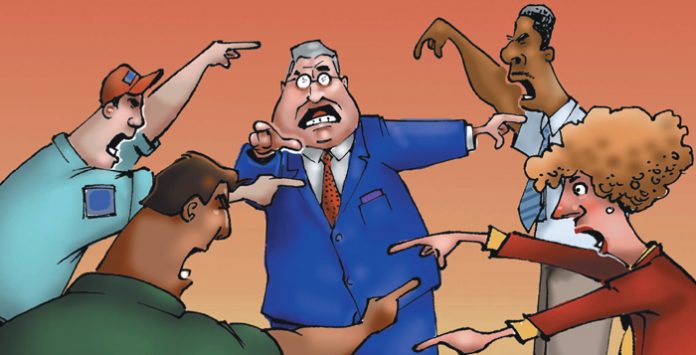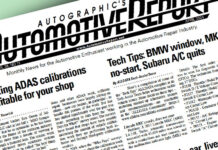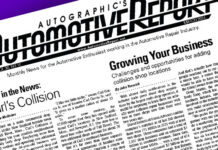By John Yoswick
Can an insurance company avoid doing business with a shop?
The validity of automakers’ design patents on crash parts.
An insurer’s alleged role in the improper repair of a vehicle.
All these are among the focus of industry-related lawsuits moving forward in courtrooms around the country. Here is Automotive Report’s annual look at current legal battles, and what they could mean for the industry.
Did insurer influence repairs?
The biggest legal story of the past year seems well-enough known within the industry that it hardly bears repeating: Last fall, John Eagle Collision Center, a Dallas-area dealership body shop, was found to be 75 percent responsible for the $42 million judgment a court awarded a Texas couple injured in a car previously repaired at the shop. The case hinged largely on the shop’s failure to follow OEM repair procedures in attaching a replacement roof to a 2010 Honda Fit. Matthew and Marcia Seebachan successfully argued in their lawsuit that their injuries in a subsequent accident were more severe because the roof separated and failed to protect them as it would have if Honda repair procedures had been followed.
The ruling has shops throughout the country placing new or renewed emphasis on researching and following OEM repair procedures. But also of interest is another lawsuit the Texas couples’ attorney filed just days after the verdict was announced. In that suit, the Seebachans allege that State Farm pushed John Eagle to make those repairs as they did. That lawsuit seeks $1 million in damages, and cites the director of the John Eagle Collision Center who indicated the insurer can “trump” OEM repair procedures based on payment practices.
“Well, unfortunately, we’re guided by insurance,” the shop’s director said in a deposition in the original lawsuit. “So…if you brought your car into my shop, the insurance company’s going to dictate…how we’re going to repair your car.”
But the insurer cannot trump the OEM procedures, can they, the director was asked.
“Yes, they can,” he responded. “By not paying the bill.”
A spokesperson for State Farm said the allegations against the insurer in the lawsuit “are not supported by the facts.” In a court filing early this year, State Farm specifically states that it neither coerced nor enticed John Eagle Collision or “any body shop to not follow vehicle manufacturers’ procedures, cut corners, take safety shortcuts or do anything that jeopardizes members of the motoring public.”
The insurer said that as part of its defense it will demonstrate that the Seebachans’ “accident and any resulting injuries and damages were the result of negligent acts or omissions…over which [State Farm] had no control.”
Regardless of the outcome in that trial, Todd Tracy, the Seebachans’ attorney, said he and the John Eagle dealership plan to work together to “improve safety standards” in the collision repair industry.
“This case is bigger than money,” he said. “This case is about industry-wide change.”
Did insurer influence election?
Another complex, long-standing legal battle with national implications centers around State Farm’s alleged role a decade ago in the election of Judge Lloyd Karmeier to the Illinois Supreme Court. That case is scheduled to be heard in early September.
The lawsuit has its roots in a 1999 ruling in a class action lawsuit (Avery v. State Farm) brought on behalf of 4.7 million policyholders related to State Farm’s use of non-OEM parts in the repair of those drivers’ vehicles. A jury found the insurer’s use of those parts, which the plaintiffs argued were inferior to OEM parts, was a breach of contract, because the insurer was obligated to restore their cars to “pre-loss condition.” The suit also alleged that State Farm had defrauded consumers by concealing problems with the parts. At nearly $1.2 billion, the verdict against State Farm was, at the time, among the largest judgments that had been levied against an insurer.
State Farm appealed the verdict, with the case eventually reaching the Illinois Supreme Court. By that time, Judge Lloyd Karmeier had been elected to his first 10-year term on that court. Lawyers for the plaintiffs in the Avery case sought to have Karmeier recuse himself from participating in the Avery decision, because they claimed his election campaign had received — directly and indirectly — significant campaign contributions from State Farm. Karmeier did not recuse himself.
Karmeier was among the justices who voted in 2005 to overturn the Avery verdict. Six years later, plaintiffs’ lawyers filed a new lawsuit claiming they have new evidence of State Farm’s involvement in the financing and campaign leading to Karmeier’s election. That’s the case that is slated to be go to trial in early September. If they prevail, they are seeking triple the damages of the Avery suit plus interest — bringing the total close to $10 billion — for the vehicle owners represented in the original Avery suit.
The Avery lawsuit has long been credited with State Farm’s limited use of non-OEM parts for nearly two decades. So the outcome of the lawsuit related to State Farm’s role in Karmeier’s election could impact the industry along with the drivers who 20 years ago had non-OEM parts installed on their vehicles.
Are automaker patents invalid?
Ford Motor Company appears to have the upper hand in another lawsuit related to non-OEM parts, one brought by the association representing the manufacturers and distributors of those parts. The Automotive Body Parts Association’s lawsuit challenges the validity of Ford’s design patents on replacement crash parts.
U.S. District Court Judge Laurie Michelson earlier this year handed both sides some bad news. She rejected Ford’s argument that the case was moot because the automaker had agreed not to sue several ABPA member distributors for infringement of the two patents (for Ford F-150 replacement parts) on which the suit was based; Michelson said the lawsuit is between Ford and the ABPA, not those distributors, and Ford has not extended an agreement not to sue to all ABPA members. Therefore, she said, the lawsuit seeks to resolve an actual controversy and is thus not moot.
But Michelson also rejected the ABPA’s plea for summary judgment in its favor before trial. To win summary judgment, Michelson wrote, ABPA had the “considerable…burden of showing that every reasonable jury would find in its favor.” But, she said, “the ABPA has not persuaded this Court to find in its favor, and so it would follow that it has not persuaded the Court that every reasonable jury would find in its favor.” She said she “sees no basis for further argument” on the ABPA’s claims that Ford’s design patents are invalid or unenforceable.
ABPA’s ability to move the case forward will largely hang on its appeal of Michelson’s ruling, which is currently pending.
Can dealer-sponsors ask for concessions?
Some recent lawsuits involve individual shops rather than national disagreements, but the issues at stake may seem familiar to other shops. North State Custom in Bedford Hills, N.Y., this year reached an undisclosed settlement with a Mercedes-Benz dealer after claiming in a lawsuit that North State’s long-time shop certification by Mercedes was dropped because the shop was unwilling to pay kick-backs to the dealer.
The dealership allegedly told North State that the dealer, rather than North State, would write estimates on any collision-damaged vehicles that came into the dealership; the dealer would collect for any parts from the customer or insurer, then send the car and parts to North State in exchange for a kick-back based on the amount of labor on the job. North State claims that when it refused this arrangement, the dealer dropped its sponsorship of North State, and the Mercedes certification was given to the other shop.
The dealership, Celebrity Auto of Westchester (which operates as Mercedes-Benz of Goldens Bridge), countersued, alleging that North State and its owner, Greg Coccaro Jr., “recklessly [used] false facts” to harm the dealership’s business. In seeking to dismiss North State’s lawsuit, the dealership also says the shop failed to cite any regulation that would make payments to the dealership as a referral source “an unlawful activity.”
In April, both sides agreed to drop their suits. Coccaro said his shop has become Mercedes-certified through a different dealer.
How solid is “shop of choice” law?
Progressive Insurance and an Oregon body shop remain locked in several lawsuits over issues including fraud, price-fixing and the state’s anti-steering regulation.
Portland-based Leif’s Auto Collision Centers last fall filed a lawsuit against Progressive that alleges price-fixing and business interference. Leif’s argues that Geico uses direct-repair agreements to hold down what it pays shops that aren’t part of Auto Repair Xpress. Geico refuses to pay for vehicle scans, the suit states as one example, and Geico steers its policyholders away from Leif’s in part because Leif’s insists on performing and billing for such scans.
“Because Leif’s refuses to follow Geico’s mandates and perform incomplete and unsafe repairs, Leif’s suffers financial losses and other negative repercussions,” the suit alleges. Leif’s is seeking damages in excess of $75,000.
GEICO has asked a U.S. District Court to throw out the lawsuit, arguing that Leif’s price-fixing claims fail because they allege only “vertical agreements” between Geico and its direct repair shops, not horizontal agreements between Geico and its competitors nor among Geico’s direct repair shops. Even if Geico’s direct repair shops agree to a lower labor rate than the average in a market, “Leif’s alleged no facts plausibly suggesting it is not in each Auto Repair Xpress shop’s individual economic self-interest to accept this rate in exchange for referrals,” Geico told the court.
In terms of steering, Geico cites the “Citizens United” case in which the Supreme Court found that corporations, like individuals, have First Amendment free speech rights, and that truthful information Geico provides its customers related to Leif’s or other shops is protected speech.
Leif’s lawsuit came just months after Geico asked a federal court to allow the insurer to refuse to do business with Leif’s, alleging that continuing to do so puts Geico employees’ safety at risk. Geico’s suit alleges Leif’s and its owner, Leif Hansen, “intentionally create an atmosphere of fear and intimidation that leads to adjusters’ inability to adequately perform their work.” It says Hansen and other Leif’s employees routinely yell at adjusters; threaten to have them arrested or to sue them personally; and carry around knives and talk about guns.
“In particular, at least one Leif’s employee has talked about ‘killing people,’ with the intention of frightening the Geico adjuster,” the lawsuit claims.
In that lawsuit, a federal district court judge this spring ruled that Geico has other remedies to deal with what the insurer claims is happening at Leif’s. Judge Michael Simon found that rather than an exemption from Oregon’s anti-steering law, Geico could contact law enforcement if there’s a crime involved in the shop’s actions; could seek an injunction against the shop’s behavior; or could file a civil suit seeking damages for harassment or other claims.
Should dismissal of lawsuits be reversed?
Leif’s lawsuit against Progressive has been transferred — against the shop’s wishes — to the same U.S. District Court in Florida that has been handling about two dozen similar lawsuits brought in recent years by shops in 18 states (including Alabama, Kentucky, Louisiana, Mississippi and Tennessee) alleging that multiple insurance companies have conspired to manipulate labor rates and other shop charges in order to reduce costs. About half of those lawsuits have been dropped or dismissed; the others remain in the appeals process after initially being dismissed.
The most hopeful news for the shops involved came last September when a three-judge panel of the 11th Circuit Court of Appeals reversed a lower court’s dismissal of the five lawsuits involving shops in New Jersey, Kentucky, Virginia and Missouri. The court ruled that if the facts presented in the lawsuits are presumed to be true, they are adequate to let the lawsuits procede. Contrary to Judge Gregory Presnell’s dismissal of the lawsuit, for example, the appeals court ruled the shops are not obligated in their lawsuit to specifically spell out when and how the insurers agreed to act in tandem on rates, steering, etc.
The insurers involved, however, have now asked that the three-judge panel’s reversal be reviewed by the entire 12-judge appeals court. State Farm, for example, argues in a 156-page brief that the dismissal of the lawsuit by the lower court was proper because the shops have failed to support their claim that the insurers were working together in an illegal conspiracy rather than merely acting similarly without any agreement. An insurer refusing to pay more than State Farm, State Farm argues, isn’t an adequate indication of collusion given that “businesses acting independently have legitimate, self-interested reasons to resist paying more than competitors do.”
A ruling in that dispute is expected this fall. •
John Yoswick, a freelance writer based in Portland, Oregon, who has been writing about the automotive industry since 1988, is also the editor of the weekly CRASH Network (www.CrashNetwork.com). He can be contacted by email at john@CrashNetwork.com.



